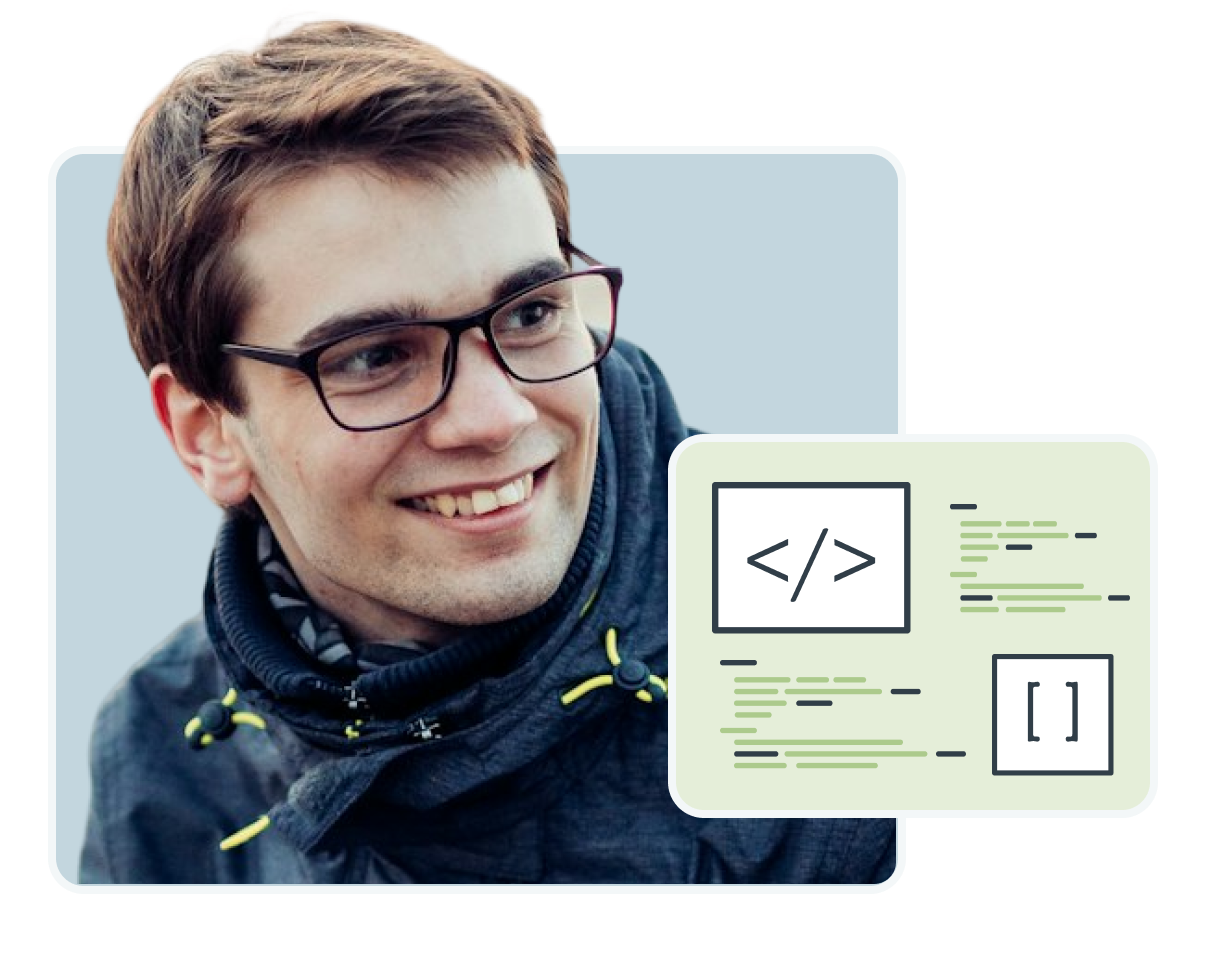Hire Docker Developers remotely from our vetted global talent
Terminal's vetted, elite global talent pool helps you hire Go developers 35% faster than traditional recruiting. Get instant access to elite Go engineers, as we only accept the top 7% of developers.






Instant Access to top Docker Developers for hire
Hire only the best — pre-screened talent ready to join your team today.
Full-time or Contractor
Software Engineer
5 - 10 Years Experience
Full-time or Contractor
DevOps Engineer
5 - 10 Years Experience
Full-time or Contractor
Software Engineer
5 - 10 Years Experience
How we hire Docker Developers at Terminal
Discover how we curate world-class talent for your projects.
Recruit
We continuously source engineers for core roles through inbound, outbound and referral sourcing.
Match
Our talent experts and smart platform surface top candidates for your roles and culture.
Interview
We collaborate to manage the interview and feedback process with you to ensure perfect fits.
Hire & Employ
We seamlessly hire and, if needed, manage remote employment, payroll, benefits, and equity.
Guide To
Hiring Docker Developers
What is Docker, and how is it used?
2013 is a year that will forever be remembered in the tech space thanks to the release of Docker, a software that would revolutionize how developers built and deployed distributed apps. Previously, programmers had to work with virtual machines and endure the torture of fixing errors that arise during migration from one environment to another.
However, all this changed with the introduction of Docker, as it eliminated the dependence on these virtual machines. Since then, building and deploying applications has never been easier as developers no longer need to worry about optimizing their applications for multiple environments. Docker is a platform as a service used to create, test, and deploy applications in record time. What’s incredibly unique about this technology is that it works via a deployment process popularly called “containerization.”
In containerization, software is organized into units, which are called containers. Containers are isolated environments that include libraries, runtime, code, and all other vital resources that an application requires to run effectively. This means that when you hire Docker developers, they can build apps that are independent of the host environment.
Why is Docker popular, and how will it benefit your business?
The 2023 Stack Overflow Developer survey saw a new entry in the top spot for “other tools” as Docker rose above npm to clinch the number one position with 51.55% of total votes by respondents. For most observers in the tech space, Docker’s rise to prominence has been nothing short of sensational. The platform has amassed many users across various regions, including famous names such as Shopify, Udemy, Spotify, and X (or Twitter if you’re still trying to get used to the name change).
But is Docker actually the best platform for app deployment, and should you hire a Docker developer for your company? While we can’t make that decision for you, we can let you in on why this technology is a favorite for many thriving businesses worldwide.
Cost Effective: Let’s face it: apart from the social impact that most innovations bring to the market, profit is also a significant driver of the majority of business decisions, including the choice of software for building applications. It’s no wonder that Docker, with its favorable long-term cost outlook, is a popular option for many companies.
We’re sure you’d agree that it’s rare to find an affordable solution that still delivers the best in terms of performance. But that’s what you get when you hire Docker developers to build and deploy your product.
Sure, most technologies claim to be the most affordable solution. However, Docker is the real deal. Compared to other platforms, using Docker requires less infrastructure, resources, and personnel. Thanks to containerization, software packages can run as stand-alone applications. This means that, unlike many traditional technologies, you won’t need as much infrastructure to run multiple services.
All these benefits, coupled with the fact that Docker operates a pay-as-you-use model, make it the perfect option for businesses wanting top value for every dollar.Compatibility: When you hire Docker developers, you’ll not need to worry about spending a lot of time setting up different environments for your application. One of the most significant advantages this technology has over virtual machines is that it is excellent for building system-agnostic products.
What does this mean exactly? Simply put, applications built with Docker run excellently on all servers. Regardless of the operating system that your customers use your software with, they can expect a strong performance.
Docker’s compatibility is a huge plus because your team will not have to worry about troubleshooting and identifying bugs in multiple environments. So your program can be easily created and maintained.
No matter where you are in the software development cycle, it’s much easier to make changes if you’re building with Docker. Sometimes, the deciding factor in who gets the largest market share is speed, and Docker is undoubtedly your best bet to clinch a win in any footrace.Increased Productivity: As we explained earlier, the launch phase is just one aspect of the product development cycle. Sure, it’s the most talked about phase, but it’s only the beginning of an even longer journey toward building the perfect application. Hence, when choosing the technology to create your applications, you must also consider how easy future upgrades and maintenance tasks will be.
Docker enables programmers to split their apps into smaller micro fragments. Each of these fragments has unique functionalities and can be seen as independent units. So, you can quickly modify and upgrade one section of your application without fear of breaking the entire code.
It’s great to know that a bug or error in one service will not cause your entire product to come to a grinding halt. So, when you hire dedicated Docker developers to add, remove, stop, or restart a service, you can rest assured that their actions will not affect the other components of your software.
Rather than spend longer hours on bug fixes, your team can concentrate on more critical aspects of product development.Portability: For many applications, developers must incorporate several resources and tools and store all these technologies in a server. The challenge with this, however, is that sharing or migrating these applications is a lot harder than it seems.
Docker allows your software team to hold your application in a container. This singular benefit offers a whole new perspective on portability and agility. In other words, you can easily transfer your product between different physical servers while retaining functionality.
But that’s not all. In an age where cloud platforms such as Azure and AWS are gaining increased adoption, the support of these technologies for Docker is an advantage that cannot go unnoticed. What every Docker developer for hire would tell you is that your company certainly has much to gain by running containers on cloud platforms. So, just like with physical servers, moving from one cloud service to another will be a breeze.Easy Application Testing: No aspect of the software development cycle is a walk in the park, regardless of the technology stack you use. Despite this, it’s a fact that some technologies can take an already cumbersome process and make it a lot less inconvenient.
Docker accomplishes this excellently, especially in the area of software testing. This platform is designed for easier continuous testing of applications at the pre and post-launch phases. For instance, Docker developers who want to push an upgrade to your app could efficiently conduct tests and implement changes in one Docker container before applying them to other existing containers.
Instead of starting from ground zero, this platform speeds up the journey by allowing programmers to make changes to already-built containers, perform the necessary tests, and deploy your application.
Whether your company wishes to test Docker images before a release or is preparing to deploy a software patch to improve performance, Docker’s ability to maintain a singular developer environment at all stages of app development will allow your team to enjoy a more straightforward testing experience.Faster Deployment: Imagine that your company is finally done testing, at least for now, and they’re sure that their application is ready for launch, and all that’s left is to deploy the software. If you’re like most people, you’d want your deployment to happen as fast as possible. Well, just in case you hadn’t already guessed it, Docker also makes deployment much quicker.
A great reason to hire Docker engineers is that they can build apps that run on the operating system kernel. This possibility, combined with the fact that Docker also supports a microservices architecture, means the overall time for your applications to boot will be drastically reduced. By now, we’re sure you have observed that most of Docker’s features are optimized to promote speedy development. Hence, it’s the best tool for startups and even well-established businesses.
When you build with this platform, you enjoy speed, high performance, and affordability in one package. Who could possibly have a problem with that?
Roles and responsibilities of a Docker Developer
Everyone has their opinions on what precisely a developer should do. While you are searching for the best Docker developers to hire, it’s also essential to evaluate your operational workflow. A lack of clearly defined tasks has a much more negative impact than most companies may notice immediately.
Although we’ve emphasized how much of a time-saver the Docker platform is, none of this would mean much if your workplace structure isn’t correctly spelled out and each member of your team is unclear about their responsibilities. So, here’s what to expect when you hire a Docker developer.
Build CI/CD Pipelines: When you hire Docker engineers for your company, they will spend a lot of time implementing continuous integration and continuous development (CI/CD) pipelines. This will involve building custom Docker images and pushing these images to the Docker Hub.
Implement Security and Data Protection: Security is a critical aspect of any application, and programmers who work with Docker are expected to be up-to-date with the latest best practices. So, you can hire Docker developers to perform essential tasks that guarantee the safety of your customer’s data, including performing container monitoring, limiting resource usage, and security management in Docker Swarm.
Carry out Automation and Scaling: Containerized applications will often need to scale as your company continues to serve more customers. And you can hire Docker engineers to handle this significant responsibility. Your Docker team will be in charge of setting up the required infrastructure for your application to scale.
In many instances, they will work with Kubernetes, an open-source platform excellent for horizontal scaling and implementing automated rollouts, workload management, load balancing, and other required functions. However, they may also enable scaling using other software such as Docker Swarm and AWS.Manage Third-Party Cloud Software: If your company deploys its Docker containers in AWS or a Google Cloud Platform, your developers will manage your accounts with these cloud service providers. For example, if you hire a Docker developer to work with AWS, they will perform tasks such as setting up your AWS account, creating Amazon EC2 instances, pushing Docker images to Amazon ECR, and creating ECS clusters.
Participate in Meetings and Prepare Reports: Apart from their technical responsibilities, Docker developers must regularly keep stakeholders up-to-date with their progress and inform them of any changes they need to implement for optimal performance. They will also be expected to attend meetings, receive and prepare reports, and collaborate with project managers and other members of your company’s software team.
What skills should a Docker developer have?
There’s absolutely no substitute for expertise. And trust us when we say hiring a top-tier Docker developer is worth every expense. But don’t be in a hurry to roll out those job postings yet. The question is, “How do you know if a Docker developer for hire can meet your demands?” While there may not be a crystal ball to predict how each employee will turn out, it will be much harder for things to go awry if you recruit someone with the correct skill set. So, here are some things to watch out for ahead of your next employment spree.
Expertise in Design and Optimization of Docker Applications: This is obvious, but it won’t hurt to mention it anyway. You should only hire Docker developers who can demonstrate significant skill in building and optimizing applications on the platform.
So, anyone you employ must be able to present a strong portfolio with completed jobs and prove that they can work with Docker-integrated developer tools such as Docker Compose and Docker Build. In addition, they should also show competence with open-source developer tools like DockerHub and Docker CLI.Knowledge of Kubernetes: If you hire a Docker developer, they would frequently need to use Kubernetes to run and manage containers. Also, they may require this software to carry out automation and scaling. Therefore, they must be highly capable of working with this container orchestration platform.
Ability to Use Cloud Technologies: One of the most exciting things about a Docker developer’s job description is that they often interact with various third-party software. And apart from Kubernetes, which we’ve already mentioned, your Docker engineers will also work with cloud platforms like Azure and AWS, especially if your company does not run containers with physical infrastructure.
Understanding of Application Deployment with CI/CD: CI/CD is a way to automate app deployment, and this method sits as the backbone of Docker development. Because your Docker software team will usually need to build CI/CD pipelines, having this skill is vital for their success in this role.
Critical Thinking: Every tech role can easily be summed up in one compound word, “problem-solving.” When you hire Docker developers in your company, regardless of the tools and resources they use, their primary responsibility will be to implement creative solutions for your business while maintaining the overall quality of your product. Trust us, it’s not as easy as it sounds. That’s why you need professionals who are excellent at thinking on their feet.
For more FAQs on hiring Docker developers, visit our FAQs page.